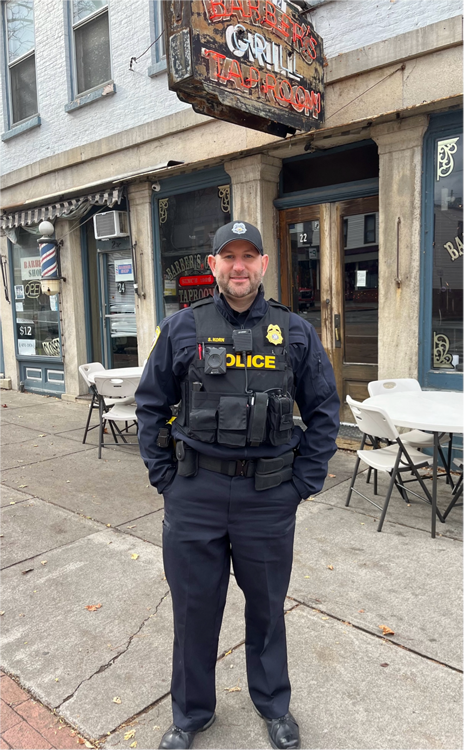Profiles in policing: Lieutenant Scott Korn
An occasional series focusing on the officers of the BPD, their jobs, their stories, and their thoughts on policing.

by Margay Blackman,
Brockport Village Mayor
April 2019. I had come from a forum on women in leadership at SUNY Brockport’s Scholars Day to the Brockport Police Department (BPD) for an afternoon ride-along with the police. The forum included a SKYPE connection with women leaders in Bangladesh, a country that had been ruled by women leaders for 20 years. Meanwhile, the biggest party day in the village was unfolding on the streets of Brockport, and I wanted to see how the college-aged crowd who opted out of Scholars Day was spending this sunny afternoon.
My police escort was then Officer, now Lieutenant, Scott Korn, and my two hours in his police car was as much an education as the Scholars Day forum. There were parties all over, but the big white house at the corner of Allen and Adams Street, where a few hundred people had gathered, was the focus of police attention. As Scott parked on Adams Street, in view of all the partygoers, a football hit the hood of his car, and he got out and retrieved it. The receiver came to fetch it as the crowd chanted to Scott, “Throw it, throw it!” He refused, handing the football back to the receiver with a quiet but firm admonition to end the party. “If I did throw it, I’d end up on Snapchat,” he explained. “You don’t want to appear as a participant in a party you’re about to shut down.” And shut it down, they did. The hosts took down the “Make Brockport Drunk Again” and the “Science Says Alcohol is the Solution” banners, the police took down names, and the partiers calmly dispersed.
The next stop was a party on Holley Street where a young woman had climbed over a fence into a backyard to steal a big blue Trump flag off a shed. The shed owner had insisted that the police arrest her for criminal trespass. She sat in the back seat of Korn’s police car, handcuffed, sobbing uncontrollably. “I’m a women and gender studies major,” she wailed, “I’m an activist for all the people that are so affected by hate in this world. My friends kept yelling for me to go over the fence, so I did.” Officer Korn calmly explained the arrest, the court appearance procedure, and the opportunity for her to tell her story there. I could only imagine how much better off she would have been had she attended that Scholars Day forum on women and leadership.
- • • • •
Lieutenant Korn’s route to policing was not as direct from childhood as Chief Wheat’s. Both Scott and his wife have degrees in teaching from SUNY Oswego. Upon graduation, they agreed to go where the first one got a job. Scott’s wife found a position teaching high school chemistry and physics in Binghamton. Scott, an English Education major, wanted to put his teaching degree to use, so he took a job doing youth drug and alcohol counseling, first at a hospital, then full-time at Binghamton High School. But he soon found the work overly predictable and decided to look for something more challenging. A citizen’s police academy offered in Binghamton sparked his interest, and Scott signed up. “It was like a 10-week-long interview,” he remembered. The ride-along with the police clinched it. He took the civil service exam for policing, passed the agility test, and secured an interview with the Binghamton Police Department. He got the job with the City of Binghamton, where he served as a police officer in a department of 100+ members from 2015 to 2018.
A desire to be closer to family brought the Korns back to the Brockport area, where both sets of their parents live. Brockport Police Department Officer Elliot Cave, a family friend, recommended Scott for a job with the BPD. Moving from a very large department to a small one was an adjustment for the new guy thrown into a closely-knit group. “It’s a bit like meeting your in-laws for the first time,” Scott said. Officer Korn began in April 2018, working nights, which he liked, as have others in the BPD.
In 2021, Officer Korn was promoted to Sergeant, overseeing the First Platoon – the night shift. In that capacity, he patrolled the streets and authored the weekend report. The report chronicled the police activities on Friday and Saturday nights as SUNY students and other young people celebrated the weekend in the village. The report began during COVID-19 and was shared with the university until the pandemic ended. I looked forward to Mondays, reading about the late weekend night happenings in my village described in Sgt. Korn’s crisp, English-major language. I equally lamented the closing of the weekend report for the summer months.
Continuing up the ladder of ranks, in June of 2024, Sergeant Korn became Lieutenant Korn. A formal police swearing-in is an impressive event. It brings out the blue-uniformed fellow officers and the families of the newly hired and promoted. The BPD is a young department of officers with young children. There’s always a participatory role for the kids. At his swearing-in, Lt. Korn’s son and daughter led the pledge of allegiance, which they had dutifully practiced for days in advance, and his daughter pinned his Lieutenant’s badge on him.
Three things from our discussion of Lieutenant Korn’s new status struck me – The advantages of a small police department, his interest in research, and his mission for his new position.
About small departments: “We know 99% of the people we are going to see just from their address. In a smaller department, you are responsible for everything from A to Z; you’re a jack of all trades, which makes the job exciting. You can get lost in bigger agencies with highly specific jobs. Even specialists here can do an investigation, a DWI arrest, and write a warrant. We have no room for someone who can only write traffic tickets.” Thinking about large departments, Lieutenant Korn recalled that, in three years, he never really got to know the Binghamton Police Chief nor sat in his office. “We have a really close department in Brockport which is nice, but a rare thing.”
He also confessed to a love of doing research, especially related to his job – be it accreditation or abandoned vehicles. If you’re a teacher, he said, “you’re a lifelong learner.”
Having climbed the ranks to Lieutenant, Scott Korn’s heart is with the patrol officers. “I see my role,” he said, “as trying to remove barriers from the people who are doing the most difficult jobs, to make patrolmen’s jobs easier, which in turn would make sergeants’ jobs easier.”
His daily routine runs the gamut from internal investigations, handling complaints, scheduling, grant writing, training, liaison to village court, payroll, supervising large-scale events as they arise on his shift, to working closely with the chief and talking with the public.
For our final meeting, we decided to take a walk in the village. I called it a community policing walk. Scott describes community policing as “throwback policing.” Picture the old-fashioned cop walking the beat, standing on the corner, or directing traffic – visible, accessible, and on foot.
We set out from the BPD, walking towards Main Street. I wondered if this was his routine daytime walk. He cautioned, “You don’t want to be too predictable where you walk every day. And you try to stay close to the car so you can run back there if you need to.” He added that, on the nighttime shift, officers walk all quadrants of the village, hitting any crime hot spots.
Off Main Street, we looked down alleys, through a backyard with gaps in the fence, late night routes that people could take to King Street where large, impromptu gatherings of college youth have occurred. Walking by the retaining wall of the Smith Street bridge on Clinton Street, Scott mentioned a special detail he had put on this location, which is a magnet for late-night graffiti artists. Artists come to spray paint on the wall and then take a video of their work to put on YouTube. So far, the stake-outs haven’t yielded any miscreants.
Now in a mostly administrative position, Lt. Korn said the policing he misses the most is being out on the road and talking to people. So, he tries to get out as much as possible, even if just for a walk. “Good cops are always looking for a way to interact with people. Very few community-building situations are better than that.”





